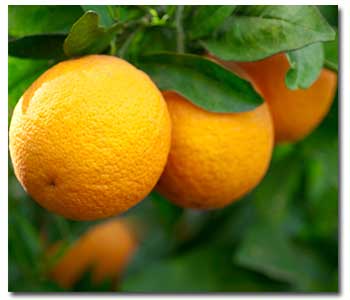Citrus in the Landscape

You can have your very own “citrus grove,” right in your yard. Citrus trees are ornamentally beautiful, have fragrant blooms, are evergreen and boast colorful fruits all year long. Who could ask for more? Walk out into your yard and pluck an orange, lime, lemon, grapefruit, kumquat or your citrus of choice – fresh and delicious.
Now, we don’t mean to imply you should add rows and rows of citrus trees. But you can select your favorite citrus trees and incorporate them into your landscape, front or back yard. Also, dwarf citrus grow great in containers. Include them in that container-designed area of your patio or deck. If you plan to plant a citrus tree in a container, use cactus mix as the planting soil. This will give your citrus tree the best drainage.
Citrus trees love full sun and well-drained soil. They prefer sandy soils. If you have more clay-like soil, amend heavily or plant the tree on a slight mound to keep the roots elevated for good drainage. And don’t forget to mulch, mulch, mulch! Citrus trees like moist soil, but not saturated soil. If you have clay soil, take care not to over-water in the root areas of your citrus. It is also best not to under-plant these trees at all, especially with grass that needs lots of water.
Fertilizing is important for citrus. They are heavy feeders and need lots of nitrogen. That should make sense when you observe their continuous foliage-growing, flowering and fruiting cycle. They also need other minerals such as iron, manganese and zinc. Yellowing leaves with dark veins are a sign of chlorosis from iron deficiency. Yellow mottling or blotching on leaves can be characteristic of manganese and/or zinc deficiency. If you are uncertain of what is happening with your citrus, bring us a leaf or two and we’ll direct you to the correct fertilizer. Grow More® Citrus Growers Blend is one of our most popular for providing nutrients your citrus need.
Unhealthy citrus can get pests such as aphids, mites, scale, mealybugs, sooty mold and/or whitefly. Keep your citrus healthy with regular organic fertilizing, a full sun location, mulch, and regular water but not saturation. It also helps to mulch with worm castings from time to time.
If you do get one of or a combination of the above pests, the first type of treatment is spraying with water. You can knock off all of the listed insect pests with a hard blast of water. And you can clean foliage coated with black sooty mold with water and finger scrubbing. There are several products which can be used to help combat some of these pests as well. Monterey® Garden Insect Spray is an organic pest control and Bayer® Fruit Citrus and Vegetable Insect Control is for your conventional grower.
If you are growing your citrus in a container, all of the above instructions are for you, too. However, you may need to water more often, because containers tend to dry out.
Citrus are excellent landscape plants that add to your gardens an attractive form, glossy green foliage, perfume fragrance, colorful fruits and above all, delectable eating! Come in to see us for all the products; citrus food (conventional or organic), nutrients and amendments you’ll need to start and maintain your new citrus tree(s).











